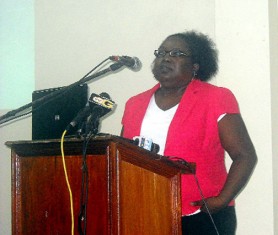…shotgun weapon of choice, citizens have role
Gun-related violence in Guyana has evolved into a serious epidemic but it is the responsibility of all citizens to tackle this issue and not lay the burden at the feet of the police, Roxanne Myers, the co-chairman of Partners for Peace and Development says
.
Speaking yesterday at a poorly-attended public forum hosted by the

non-governmental organisation under the theme ‘Keeping our Communities Gun free and Safe’, Myers also stated that arming oneself with a weapon as a means of protection is not the solution to the problem.
Addressing the handful of persons who gathered at the National Library, she said that data on gun violence was taken from three dailies – Stabroek News, Kaieteur News and the Guyana Chronicle, as well as the police. The gun violence analysis was part of a regional undertaking by the Caribbean Coalition for the Reduction of Armed Violence, to understand the phenomenon and provide recommendations for collective action against the growing trend of misuse of arms in the region.
While most of what was presented yesterday was gathered from January to August of this year, data collected since 1999 was also included
.
Myers explained that at the end of each month a summary of the kinds of crimes that were committed, the kinds of weapons and the places were the crimes were committed was documented.
Before giving an in-depth analysis of the data, Myers opined that “it is our individual responsibly to deal with the reduction in gun crimes. It is not the responsibility of the state or the police. The police are not necessarily going out there and committing crime. They are the ones we entrust with solving the crime and that is one aspect of the problem.”
She noted that the aim of the forum was to bring awareness to the fact that each individual has a role to play in crime prevention.
According to Myers, the borders with Brazil and Venezuela, two producers of small arms, are very porous and there is also the open border with Suriname, which adds to the problem of illicit weapons entering the country. She noted that guns are also entering the country through manned ports of entry.
Myers stated that according to the data collected from 1999 to present, murder and robbery with the use of guns tops the list of all major crimes.
Using graphs to simplify the analysis she showed that from 1999 there has been a steady increase in murders and a stark increase in robbery under arms. From the data collected over the years, the figures have been fluctuating.
The data showed, she said, that shotguns are the preferred weapon of choice for crimes followed closely by revolvers/pistols.
Firearms seized by police (unlicensed – either brought into the country illegally or stolen) from 2001 to 2003 were on the increase. There was a very high recovery rate in 2007 and 2008.
“People feel that they need to arm themselves to protect themselves and families. If [they] don’t have a firearm, the bandits, they feel, will come and take all that they have. The truth of the matter is that many firearm holders hardly get the opportunity to use the firearm when they are attacked or when someone enters their premises,” she said.
She later pointed out that there are many instances, according to newspaper reports, when firearms are stolen during robberies, sometimes from security guards.
She said that according to the police, 73 illegal guns were recovered between January and August but based on newspaper reports, only 33 were recovered.
Myers stated that contrary to popular belief, crimes committed by minors (those below 17) are very few and according to police records gun crimes are committed mostly by persons between the ages of 35 and 45.
The data collected by the six-member team headed by Myers, also revealed that gun violence is most prevalent in Georgetown, followed by Berbice, East Coast Demerara and East Bank Demerara.
Myers described the crime situation in the interior regions as alarming.
During the discussions, the group was complimented for its efforts and urged to continue compiling data and making it public.
Contributions came from, among others, parliamentarians, Everald Franklin and Raphael Trotman along with University of Guyana lecturer Andrew Hicks who made suggestions on analysis of data on youth involvement in crimes and the tracking of illegal weapons.









